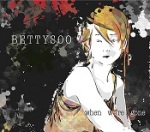“When We’re Gone” – Betty Soo

 Sometimes you just have to marvel at the resilience of songwriters and artists as you wonder how they can take utterly chaotic and sometimes tragic lives and create works of outstanding beauty from it. BettySoo has put this album together over a five year period spent dealing with things that would leave most of us beaten into submission, but she’s taken inspiration from even the most difficult of these situations and turned it into an album full of variety, pathos and even hints of joy. The most potent songs in this collection are the snapshots of people in difficult and sometimes impossible social circumstances trying to find a way to make it to the next day or next period of calm.
Sometimes you just have to marvel at the resilience of songwriters and artists as you wonder how they can take utterly chaotic and sometimes tragic lives and create works of outstanding beauty from it. BettySoo has put this album together over a five year period spent dealing with things that would leave most of us beaten into submission, but she’s taken inspiration from even the most difficult of these situations and turned it into an album full of variety, pathos and even hints of joy. The most potent songs in this collection are the snapshots of people in difficult and sometimes impossible social circumstances trying to find a way to make it to the next day or next period of calm.
The core musicians supporting her on “When We’re Gone” are Brian Standefer (whose lugubrious cello permeates almost the entire album), Glenn Fukunaga (bass) and Dave Terry and Rick Richards (drums and percussion), but it’s not a full-on band sound; everything is used sparingly to create delicate textures for some tender and fractured tales of society’s outsiders and to leave lots of space for BettySoo’s pure, clear tones (maybe somewhere between Early Joni Mitchell and Suzanne Vega).
I could write at great length about all of the songs on the album, but we’re on a deadline here, so I’m just picking out a few of the many great songs here to give you a flavour of “When We’re Gone”. “Josephine” is a classic piece of songwriter misdirection; the first verse leads you into the seemingly familiar territory of the unfaithful husband arriving home with telltale lipstick signs, but the subject switches dramatically when you realise that his secret life is as a cross-dressing torch singer. It still manages to be a sad song of fleetingly-fulfilled potential, despite the relief we feel that the central character isn’t cheating in the conventional way. “The Things She Left Town With” is the story of a woman who has escaped from her past to an uncertain future of financial insecurity and substance abuse and the power of the song is in telling the story without imposing any interpretation; this is just the way it is.
The disintegrating relationship in “Hold Tight” is described in a series of escalating armaments images as it moves towards its goal of mutually assured destruction and it’s a clever extended metaphor, but it’s no academic exercise, there’s a genuine power and pathos in the imagery of lines like ‘When love shatters, shards, fragments fly everywhere’. And that leaves the most powerful song on the album, the bleak and harrowing “Nothing Heals a Broken Heart”.
There’s no misdirection here, the first line of the song tells you that this is about something more than a bit of infedility. The song deals with the death of a child and the reactions of people around the bereaved mother and it’s uncompromising but not judgemental; the platitudes of the onlookers are exposed but not criticised. The ultimate message is that you come to terms with your continuing life, but the broken heart never heals. This must have been an incredibly difficult song to write and even more difficult to perform but you can’t listen to this and remain unmoved. It’s a remarkable achievement.
“When We’re Gone” is out on October 30th.


